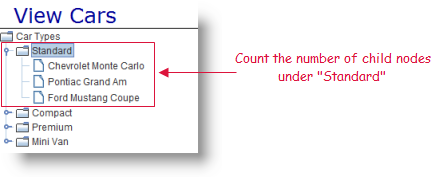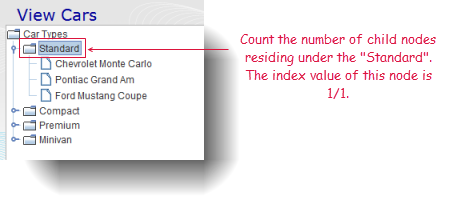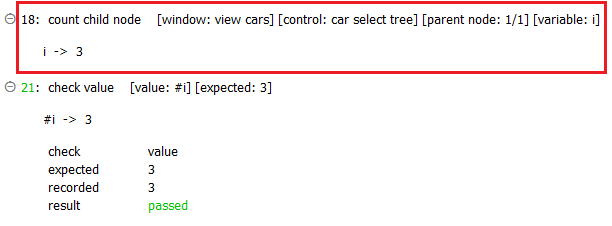count child node
Return a count of the direct descendants of a given node in a tree.
| Name | Description | Type | Modifier |
|---|---|---|---|
| window | TA name of the window. | Interface Entity | None |
| control | TA name of the tree control. | Interface Element | None |
| parent node | Path to the node whose immediate children (the nodes residing beneath it on the next lower level) are to be counted (see ). | String | None |
| variable | (Optional) Variable to receive the returned value. | String | None |
A count of the direct descendants of a given node in a tree.
This action may be used within the following project items: test modules and user-defined actions.
This action is applicable to the following controls: tree view, tree table, tree list.
Example - Case 1: Using a text value for parent node

interface
use interface Car Rental
 
window control parent node variable
count child node view cars car select tree Car Types/Standard i
 
value expected
check value #i 3

Example - Case 2: Using a numerical index for parent node

window control parent node variable
count child node view cars car select tree 1/1 i
 
value expected
check value #i 3

- parent node argument:
- The node path may be specified by its display textor by a numerical index representing its cardinal placement in its branch, with index values starting at 1.
- If a node path of more than one item must be specified, use forward slashes ( / ) as delimiters between node levels.
- Enclose a numerical text string in quotation marks to differentiate it from a numerical index value. For example, if a text value of an item in a control has a value of
12, you should reference that item by passing12surrounded by quotation marks (that is,"12") instead of the numerical12. Passing the numerical12is treated as a reference to an item with an index of 12, rather than an item holding a text string value of12.
- variable argument:
- If the variable in argument variable has not been declared, the action creates it as a global.
- If the variable argument is left empty, TestArchitect supplies a global variable with the name _result.
- This action supports the <ignore> modifier. If the string
<ignore>is present as the value of any of the arguments, or any argument contains an expression that evaluates to<ignore>, the action is skipped during execution.